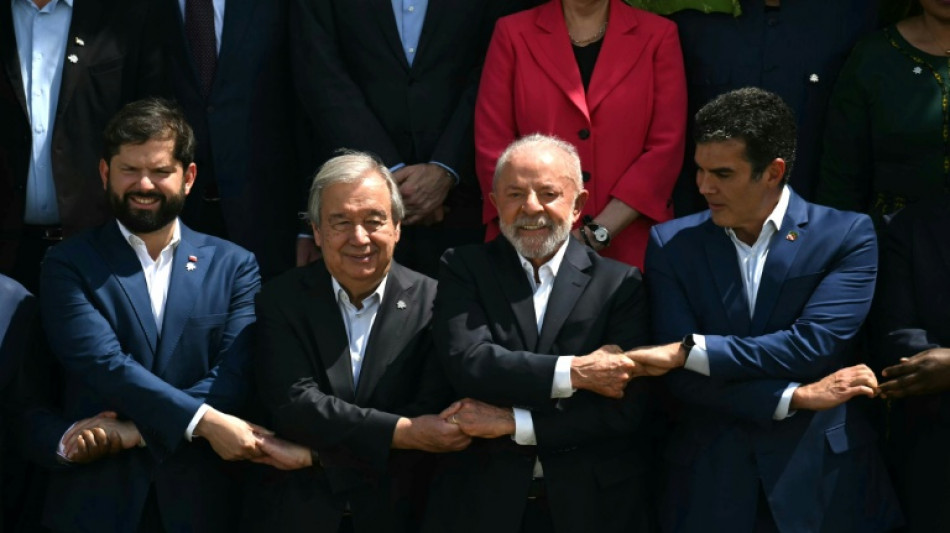
Earth cannot 'sustain' intensive fossil fuel use, Lula tells COP30

Brazil's President Luiz Inacio Lula da Silva on Friday said Earth can no longer sustain humanity's dependence on fossil fuels, and without confronting this reality the climate fight will be lost.
The leftist leader spoke at a pre-COP30 summit in the Brazilian Amazon where other heads of state and government implored all nations to start weaning off the burning of coal, oil and gas responsible for most of the planet-heating pollution.
Evidence of dangerous warming has never been clearer: the decade since the Paris Agreement has been the hottest on record, marked by intensifying hurricanes, heatwaves and wildfires.
Lula said tackling the urgent question over the future of energy would determine "success or failure in the battle against climate change."
"Earth can no longer sustain the development model based on the intensive use of fossil fuels that has prevailed over the past 200 years," Lula told world leaders in Belem, where the UN climate talks are taking place.
Brazil has stressed that each country would pursue its own course to "transition away from fossil fuels" -- a pact made by all nations at a previous COP, in Dubai in 2023.
Lula is presiding over the world's top climate negotiations just weeks after his government approved new oil drilling in the Amazon region.
But Joao Paulo Capobianco, executive secretary of Brazil's Ministry of Environment, told AFP: "Brazil hopes that this issue of phasing out the use of fossil fuels will effectively be on the agenda," adding "If we truly want to enforce this Dubai decision, we have to build the roadmap."
Rwanda's environment minister Bernadette Arakwiye stressed to delegates that they face a stark choice.
"We can continue with incremental progress while the planet burns, or we can rise to meet the scale of this crisis," she said.
- Luxury flight tax -
The absence of leaders from the world's biggest polluters, including the United States, where President Donald Trump has dismissed climate science as a "con job," cast a shadow over talks, but also catalyzed calls for greater mobilization.
France, Spain and Kenya are among a group of countries spearheading a drive at the COP30 climate summit for a new tax on luxury air travel, rooted in the idea that the small elite of premium flyers should pay more for their outsized contribution to global warming.
"It is only fair that those who have more and pollute more should pay their fair share," Spanish Prime Minister Pedro Sanchez told the summit.
"We want to expand the coalition and, in particular, bring in more European states," a source told AFP.
The proposal is sure to face headwinds from the aviation sector, responsible for about 2.5 percent of the world's carbon emissions.
- Roadmap support -
Climate change has slipped down the agenda as nations grapple with economic pressures, trade disputes and wars, as well as the Trump administration's aggressive push for more fossil fuels.
Lula lamented the "pressure and threats" that led the International Maritime Organization (IMO) to postpone a plan to curb shipping emissions, and also spoke of the need to pursue alternative fuels for transport and industry including ethanol.
And the latest round of negotiations to agree a world-first treaty on plastic -- a byproduct of oil and gas manufactured by petrochemical companies -- collapsed in August.
Even so, Brazil has won support for a new fund to save the world's forests, quickly raking in over $5 billion in pledges to reward tropical countries for not chopping down trees.
Germany Chancellor Friedrich Merz said Friday his country would "make a significant contribution to this initiative," without spelling out a figure.
The world remains off track to keep end-of-century global warming below 1.5C compared with pre-industrial levels -- the Paris Agreement's primary target, deemed necessary to avert the worst catastrophes of climate destabilisation.
But UN climate chief Simon Stiell stressed that, 10 years on from the Paris deal, global cooperation was delivering results.
"Without that act of collective courage, we would still be heading for an impossible future of unchecked heating, of up to five degrees," he said. "Because of it, the curve has bent below 3C -- still perilous, but proof that climate cooperation works."
burs-np/ia/des
J.Campbell--SMC


 London
London

 Manchester
Manchester
 Glasgow
Glasgow
 Dublin
Dublin
 Belfast
Belfast
 Washington
Washington
 Denver
Denver
 Atlanta
Atlanta
 Dallas
Dallas
 Houston Texas
Houston Texas
 New Orleans
New Orleans
 El Paso
El Paso
 Phoenix
Phoenix
 Los Angeles
Los Angeles



